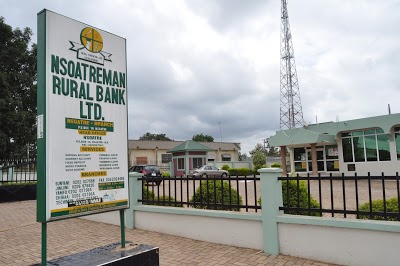Contrarily to the hesitation of many banks and financial institutions to advance support to the agricultural sector, the Nsoatreman Rural Bank Limited at Nsoatre in the Sunyani West Municipality of the Bono Region has resolved to prioritise agricultural financing in the 2021 financial year.
“The bank has started giving out more agric loans, particularly to food crop farmers in our catchment area. Currently, agriculture is one of the viable sectors for investment. Besides, the move is meant to boost guarantee food security and help rebuild the country’s economy after the devastating impact of the COVID-19 pandemic”, Mrs. Agnes Grimmon Intsiful, General Manager of Nsoatreman Rural Bank, has said.
She explained that in the wake of COVID-19 threat to the socioeconomic fabric of the country, it has become imperative for more deliberate efforts to cushion agricultural growth and development, hence the decision. The bank has increased its loan portfolio for producers of maize, tuber crops, vegetable and cocoa as well, she added.
The General Manager who was speaking to the B&FT on the sidelines of the bank’s 31st annual general meeting urged the government to institute more flexible policies and interventions to make the agricultural ecosystem attractive for investors, especially banks, saying “the country’s agriculture space needs more practical and results-oriented interventions more than ever.”
Financial performance
In adherence to restrictions on public gatherings as a means to control the spread of the coronavirus pandemic, the meeting was held virtually. The meeting considered two financial reports, covering 2019 and 2020.
The Chairman of the Board of Directors, Kofi Agyeman in an address described the periods under review as probably the most challenging moments in the history of rural and community banks (RBCs).
He mentioned the financial sector clean-up and the associated panic withdrawals; the locked-up funds with defunct Financial Houses and Fund Management companies as toxicants that corroded the gains of RCBs. The emergence of COVID-19, he added, had compounded the woes of RCBs and the economy at large as non-performing loans have increased astronomically.
In the face of the ‘overwhelming challenges’ the bank he noted, posted satisfactory growth in performance indicators for the years 2019 and 2020. The bank increased deposits from a little over 21.97 million in 2018 to GH¢30.95 million in 2020, showing an increase of 11.40% in 2019 and 40.84% in 2020.
The bank closed its books in 2020 with total assets of GH¢33.48 million, representing year-on-year-on appreciation of 13.06% and 27.75% respectively. On the other hand, total loans and advances soared from GH¢7.45 million to GH¢10.18 million.
The sum of the bank’s short-term investments as at 31st December, 2020 was GH¢15.23 million as against GH¢9.07 million in 2018. The financial reports show that the investments grew by 13.32% in 2019 and 48.15% in 2020. In the years under review, the bank had its share capital going up marginally by 8.06% and 9.79% respectively, pegging to figure at GH¢GH¢1.41 million.
The Board Chairman however disclosed that the operational challenges eroded the profit gains of the bank, thus accounting for a cumulative loss of GH¢679,268. The loss coupled with Bank of Ghana’s directive, he indicated, made it impossible for the Directors to recommend payment of dividend to shareholders.
Mr. Agyeman expressed profound gratitude to the management and staff of the bank for their dedication, hardwork, loyalty and high sense of duty that propelled the bank to weather the storm during the difficult time.
HIGHLIGHTS OF PERFORMANCE
| INDICATOR | 2018 | 2019 | 2020 |
| Total Deposits | 19,727,697 | 21,976,922 | 30,951,957 |
| Total Assets | 23,186,391 | 26,213,978 | 33,489,469 |
| Total loans & advances | 7,543,679 | 8,780,164 | 10,185,040 |
| Investment | 9,072,143 | 10,280,496 | 15,230,496 |
| Share capital | 1,189,604 | 1,285,487 | 1,411,390 |
| Profit before tax | 399,903 | (388,732) | (679,268) |
Source: thebftonline.com



